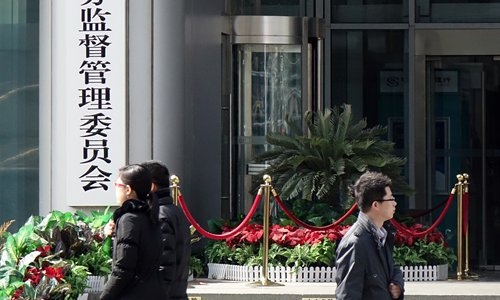
People walk outside the headquarters of the China Securities Regulatory Commission in Beijing. File photo: VCG
China's securities regulator announced on Sunday a planned expansion of the scope of eligible securities for stock linkups between the Hong Kong and mainland bourses as part of efforts to further deregulate capital markets.
The push to improve the range of product portfolios accessible to foreign investors is set to quickly create condi-tions that will equip overseas institutional investors with sound risk-hedging tools for their investments in the securities and bond markets, Fang Xinghai, vice chairman of the China Securities Regulatory Commission (CSRC), said at an international finance forum during the ongoing China International Fair for Trade in Services (CIFTIS).
The securities regulator pledged to encourage overseas securities, funds and futures institutions to expand their footprints in the Chinese market and support domestic financial institutions in exploring overseas opportunities.
The revised rules for the Qualified Foreign Institutional Investor (QFII) and the Renminbi Qualified Foreign Institutional Investor (RQFII) programs will be unveiled and implemented as soon as possible, according to Fang.
QFII and RQFII are two regimes that allow specified licensed overseas investors to participate in the Chinese mainland equity and bond markets.
China's capital market has become the world's second-largest by capitalization, underpinning the nation's eco-nomic development and transition. The continued deepening of capital market deregulation is evidenced by the expansion of the market's two-way opening-up and a continued rise in investors' holdings of Chinese securities, the opening of the domestic futures market and increasingly convenient international financing for firms, Fang stated.
Speaking at the forum, Yin Yong, vice mayor of Beijing, expressed support for foreign-invested financial institutions taking part in stock, bond, foreign exchange and fund trades.
Describing the nation's financial deregulation and efforts to allow for market-based competition as a top-down and systematic push, Stephen Xie, PwC China Corporate Finance Partner, told the Global Times on Sunday on the sidelines of the CIFTIS that China has ramped up its financial deregulation since the China-US trade war as a sign of the government's resolve to open the market and strictly enforce policies.
The nation has pushed for direct financing and the creation of a multi-layered capital market over the past decade and relevant efforts can be seen developing into action programs, rendering China's financial markets a magnet for foreign investment, Xie said.
As of Thursday, mainland shares held by overseas investors through the stock linkups hit a market valuation of 2.01 trillion yuan ($293.75 billion), accounting for 3.28 percent of the total circulated A-share capitalization. This, in addition to stocks held by overseas investors thorough QFII and RQFII, totaled 4.69 percent of the entire circulated market cap reading, according to Fang. The ratio pales in comparison to that of Japan and South Korea.
There is still great potential to funnel overseas funds into the mainland stock market, the CSRC vice chairman predicted.
The total valuation of the A-share market has hit 70 trillion yuan, making up 70 percent of GDP. The number of firms traded on domestic exchanges hit nearly 4,000, per CSRC, and the stock market has maintained a stable performance this year with an average daily turnover of around 800 billion yuan.
Notably, Fang stressed that with China and the US strengthening communication, Chinese firms have not stopped the pace of pursuing US listings.
The discrepancies between Chinese and US capital markets lead to some Chinese businesses opting to float on the US market, due to not meeting domestic listing requirements or out of other concerns. Despite this, the rapid rise of China's domestic market, particularly its STAR Market in Shanghai and ChiNext board in Shenzhen, will lure an increasing number of premium Chinese firms, notably unicorns, into its home markets where they are closer to local consumers and investors, PwC's Xie said.
The opening-up of the nation's capital market over the past three decades has been stable and has avoided sending shocks to the market, which is fairly uneasy, he said, adding that the nation will move swiftly to prevent and address cross-border capital market risks, strengthen regulatory cooperation in auditing cross-border listed firms and toughen the crackdown on financial fraud.




